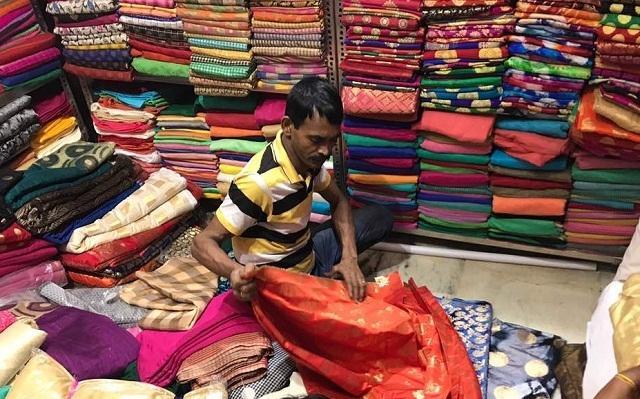Assam NRC Hits Bengal Garment Business in Puja Season

Representational Image. Image Courtesy: whats Hot
Kolkata: “For this Puja season, as usual, we had to negotiate gold loan to be able to buy cloth in bulk for making kidswear. But unfortunately this time round, our wholesale business is substantially down, a key factor being the NRC in Assam,” said Moidul Islam, whose family has been involved in kidswear making for many years.
“The members of the family, Moidul said, are emotionally attached to the tailoring shop.” His shop is one of the several hundreds located in Kolkata’s congested southern fringe, Garden Reach.
On being asked what their options are in the given circumstances, he said they would try to sell the stocks on no-profit basis in small lots of 6-12 kidswear and thereby try to recover the investment. “After all we have to anyhow repay the loans and get the ornaments released. We manage somehow with all the adult family members working and handling different responsibilities – cutting the cloth, stitching, labelling, packing and despatching to the buyers’ end,” he said.
A very large number of tailoring outfits and garment traders have to take recourse to loans, including gold loans, for funding their business during festive occasions as they have to procure cloth, cut pieces, accessories and other inputs in bulk for bulk production of garments for different age groups of girls and boys. They segment the total business among themselves.
Also read: Left, Dalit Leaders Warn of Unrest if NRC is Undertaken in Bengal
There is a general downturn in order flow from different locations this festive season, the shrinkage ranging between 50 and 65% than last year but, the “Assam NRC has proved to be the single most adverse factor as orders from that state constitute almost 30% of the total shortfall,” Moidul pointed out.
The local garment makers get bulk orders from several districts and towns of Assam, such as, Dhubri, Silchar, Dibrugarh and, of course, Guwahati – the biggest city in the state which also houses the capital. They also get sizeable orders from the nearby West Bengal’s Alipurduar town and Coochbehar district.
Many families of Assam have their relatives in the bordering West Bengal district towns and the National Register of Citizens exercise in Assam has affected them too due to documentation and related problems. They are on the look-out for legal aid. Therefore, in these areas, affected people’s first concern is to come out of the citizenship tangle. Festivities for them have taken a backseat.
For reasons the garment makers are unable to zero in on, order inflow from Tripura, too, has shrunk this festive season. In normal circumstances, they get good bulk business from Tripura as well, “as culturally, there is a good degree of affinity amongst Assam, Tripura and West Bengal”.
The outstation buyers, who also include people from South India, purchase their bulk requirements from two major ‘haats (local markets) – ‘Mangalahaat’ in the Howrah area held on Mondays and Tuesdays and the one at Matiabruz in the city’s southern fringe where Saturdays and Sundays are ‘haat’ days. The two ‘haats’ are known all-over the country. “We have some idea about the volume of business, but certainly not their value,” said textile trade sources.
Also watch: Stateless in Assam: Voices of the Affected People
Moidul and several thousands like him are all members of the West Bengal Tailors’ Union (WBTU), which is affiliated to the Centre of Indian Trade Unions (CITU). Asadullah Gayen, general secretary CITU told NewsClick that the union has close to 40,000 members, a vast majority of whom are in the garment business in all the three scales – small, medium and large.
An interesting point made by Asadullah is that the garment business in the city usually presents a contrast – while other businesses often see downturns and people either lose jobs or do not have work for specific number of days in a week, the garment business – because of the all-India clientele – usually keeps growing, providing opportunities to an increasing number of job seekers. Labour is aplenty and cheap; the skill level is high. Which explains why, in a sense, “we are generally ring-fenced,” he observed.
“The prevailing pessimism about the state of the domestic economy and the strain being experienced by the automobile, banking and real estate sectors, among others, have impacted our fortune too,” he said.
He recounted what he saw during his recent visit to Alipurduar in North Bengal, where the ripple effects of Assam NRC are being felt. “There is no rush in the bazaars, although the Puja season is virtually knocking at the door. People are genuinely concerned about the after-effects of the Assam NRC exercise and their future. And, as if to rub salt in the wound, the ruling side at the Centre is talking about terms of an NRC-type mechanism for our state,” he added.
The festive season is the best time for the garment business. Those owning it and involved with it toil it out to generate surplus income, which sees them through the lean period of a year. But, at this point of time, people are worried as to how they will dispose their unsold stocks, recover investments and clear their debts, Asadullah observed.
Also read: NRC in Perspective: What Can't Be Cured, Has to Be Endured
Get the latest reports & analysis with people's perspective on Protests, movements & deep analytical videos, discussions of the current affairs in your Telegram app. Subscribe to NewsClick's Telegram channel & get Real-Time updates on stories, as they get published on our website.
























